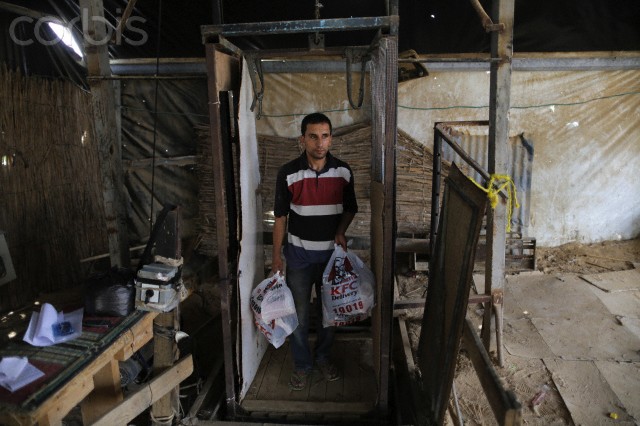Of Gaza and KFC
I was struck last week how much play the KFC-delivery-to-Gaza story was getting — every paper seemed to be lazily copying the Xinhua original. Paul Mutter expands below on the problems around that coverage.
What started out as a blurb on the Xinhua news site this week on the smuggling of KFC for US$30 an order into Gaza via Egypt - a tunnel trek that can take between 3 and 7 hours - has gone viral, prompting several other outlets to send correspondents into Gaza to report on the Al Yamama delivery company’s entrepreneurial niche. The tunnels have been used to deliver everything from rockets and rebar to TVs and fiancées - up to 30% of all the strip’s imports come through them, says Reuters - so fast food is not a stretch, even at the prices quoted.
Unfortunately, most social media responses to it have focused on the novelty at the expense of the context, even though the two fullest accounts I have read, from the NYTand Christian Science Monitor, do address the environment of the Israeli blockade and the tunnel economy that the Egyptians have been cracking down on so hard these days to try and interdict Sinai arms smuggling.The “Live from Gaza” blog, in fact, offered this criticism of the piece: “it’s good material to exploit to diminish the idea that Palestinians in Gaza [a]r[e] suffering from siege.” So far, I have not seen that angle argued in any news outlets, but reports on malls and swimming pools in Gaza has been cited before to demonstrate that Gaza is thriving despite the blockade. The Israeli government officially puts that line forward, in fact. Fares Akram, who wrote the original Xinhua report and the longer NYT version, has explained his rationale for approaching the story: it takes in the “Israeli siege” as well as the role of the smuggler, while noting the “difficulties p[eo]pl[e] face in Gaza with a metaphor familiar to the [W]est; KFC.”
The Christian Science Monitor’s Ahmed Aldabba also provides this context: “[t]hose who order are well-to-do people and don’t care much about the price of the food compared to the original price at the restaurant.” It’s a purchase for the well-traveled, too, since it’s desired by jet setters who had it in the US - not unlike how Americans will come home and spend US$40 on a plate of sashimi after a business trip to Japan.
Considering it used to be US$200 an order, it’s not surprising that sales have gone up as the blockade has been toned down somewhat since 2010. But obviously, KFC isn’t breaking into the lower-income bracket yet: around 80% of the population in Gaza is classified as refugees, and the poverty line is at least 38%, so it is worth remembering that the US$30 a bucket prices - which are already higher than they are in Egypt - represent a fair bit of change even for those who can afford it. The reporting makes clear that this fried food fad is the provence of entrepreneurs who want “in,” and the middle class who want to have something to dine on besides the usual fare.
So you wonder, then, why is it that people would pay so much for it. Or, for that matter, why the entrepreneur who wants to open a KFC in Gaza is worried, among other things, that he will not be able to import fryers or schedule visitors from the corporate office.
According to the Canadian International Development Agency, 50% of the strip’s population is considered “food insecure.” While that number may be lower now, especially with the easing of bans on food imports, but it is still significant that food insecurity exists - just because people are not starving to death in the streets does not mean poor nutrition is less of a problem; developmental deficiencies, chronic illness and stunting are all consequences of food insecurity. Moreover, one of Ariel Sharon’s top aides reportedly said that the 2006–2010 ban on importing certain foodstuffs was meant to put the Palestinians on a “diet” by setting a “calorie limit.” Starvation was not the goal; “economic warfare” was. “Such an artless admission of the use of food as means to control a population is rare,” dryly noted a report prepared for the UN’s Food and Agriculture Organization.
At least, one hopes that this context is remembered, as it is getting dropped out of all the summaries accounts other sites have posted in order to generate hits on the reporting. Like any place in the world, Gaza has wealthy residents and a middle class with disposable income. But don’t judge a country’s standard of living by these appearances. The food does not arrive via Seamless:
All this for regular, ordinary fast food! nyti.ms/YX9DSDby @faresakram
— Adi Jaya (@adidjo) May 16, 2013
@adidjo regular, ordinary but not when you are in Gaza
— Fares Akram (@faresakram) May 16, 2013
[h/t Yousef Munayyer]

